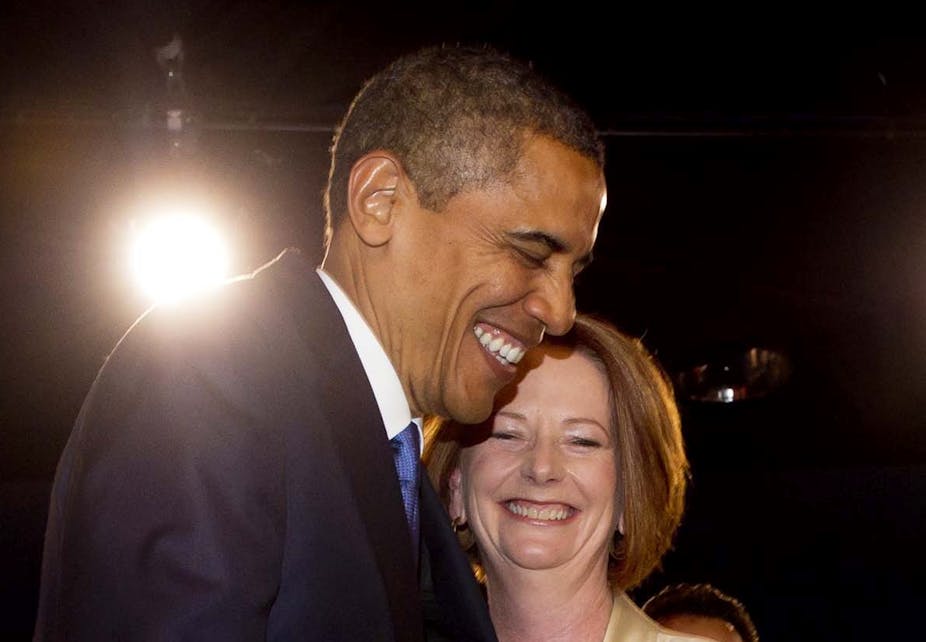*When President Obama begins his long-awaited visit to Australia today, he’ll have a keen tour guide in Julia Gillard. They’ve developed an apparently firm friendship in recent months. But should the Prime Minister be involved in foreign policy at all? Should international affairs of state be left to her trusty Foreign Minister Kevin Rudd? Cain Roberts of the University of Melbourne investigates. *
From climate change to international education, what constitutes foreign policy today has changed.
Geopolitics, security and trade are no longer the only concerns of foreign policy makers. Issues formerly more domestic in nature are now key elements of our international agenda.
Yet the way these issues are dealt with is centralised at the highest levels of government and largely without scrutiny from academics, media and the public.
First among equals
The historic position of the Prime Minister in our centralised system of foreign policy making has always been one of ultimate power.
Patrick Weller’s phrase that Australian Prime Ministers are “first among equals” in our system of government is particularly poignant in this context.
Despite a trend towards whole of government approaches, much of the decision-making power over foreign policy still rests with the Prime Minister of the day. This makes the process an exceptionally closed one, difficult for many policy actors to engage with, let alone influence.
As our last two Prime Ministers before Julia Gillard show, an overtly powerful executive remains central to the process of foreign policy in Australia.
John Howard – The Commander in Chief
During the Howard years, changes to the Department of Prime Minister and Cabinet helped create a presidential tone to the prime ministership over foreign affairs.
Howard’s belief in the nation state as the most important international actor made him suspicious of multilateral institutions. This was particularly so with the United Nations, with whom Australia wound back cooperation on areas such as racial discrimination and the Kyoto Protocol.
The demotion of the human rights dialogue with China and a preference for bilateral trade negotiations became policy objectives which reflected Howard’s world view.
These decisions were all made at the top. Vocal criticism from human rights experts on racial discrimination, pleas from scientists on the Kyoto Protocol and disquiet from key business sectors on preferential trade agreements were largely ignored.
There was never any expectation that Howard needed to consider the views of these groups, despite all being experts in the policy area.
He had the power to intervene in foreign policy decisions at his discretion.
Kevin Rudd – The Micromanager
Rudd was already an experienced diplomat when he became Prime Minister. His “three-pillar” policy of ANZUS, the United Nations and engagement with Asia drove Australia’s relations with the world under his leadership.
Despite the change from the Howard years, the institutional arrangements remained static. Foreign policy making was again centralised in one group of the Prime Minister’s department, essentially overshadowing the role of the foreign minister.
Micromanagement of pet projects like the ill-fated Asia Pacific Community became common. As with Howard, key domestic voices were ignored.
The Asia Pacific Community received negative attention from academia. Legal experts gave mixed reviews to threats of taking Japan to court over whaling and the complete implosion of Australia’s asylum seeker policy caused discontent from all sections of the debate.
Over-control of these issues by Rudd meant that focus slipped when domestic concerns drew his attention elsewhere. Centralising these issues meant that domestic expertise which may have helped achieve better outcomes could not be called upon.
A better process?
In other areas of policy development domestic actors with expertise, interests and historical linkages are involved in various stages. Can the same not occur at the international level?
In a system dominated by the Prime Minister, it is important to map the process of foreign policy creation to determine how this domination occurs and the impact this has on other voices attempting to participate.
There will always be a need for executive influence and secrecy over some areas of foreign policy. There may never be complete agreement over how Australia should tackle certain international issues.
However, striving for best practice policy through consultation and engagement is often the hallmark of good policy making at the domestic level. There is no reason it should be any different at the international level.

